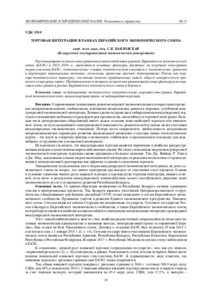Please use this identifier to cite or link to this item:
https://elib.psu.by/handle/123456789/21246Full metadata record
| DC Field | Value | Language |
|---|---|---|
| dc.contributor.author | Павловская, С. В. | - |
| dc.date.accessioned | 2018-02-02T12:13:52Z | - |
| dc.date.available | 2018-02-02T12:13:52Z | - |
| dc.date.issued | 2017 | - |
| dc.identifier.citation | Вестник Полоцкого государственного университета. Серия D, Экономические и юридические науки. - 2017. - № 13. – С. 41-45. | ru_RU |
| dc.identifier.issn | 2070-1632 | - |
| dc.identifier.uri | https://elib.psu.by/handle/123456789/21246 | - |
| dc.description | Trade Integration in the Framework of the Eurasian Economic Union S. Pavlovskaya | ru_RU |
| dc.description.abstract | Рассматриваются итоги интеграционного взаимодействия в рамках Евразийского экономического союза (ЕАЭС) в 2015–2016 гг., выделяются основные факторы, влияющие на торговую интеграцию стран-участниц ЕАЭС: геополитические («новая геополитическая ситуация»); экономические (различия в структурах национальных экономик; системные кризисные явления; доминирование России как торгово-экономического партнера); соседства (наличие традиционных связей, общего исторического прошлого, культурные связи). Предпринимается попытка осмысления влияния выделенных факторов на торговую интеграцию в рамках Евразийского экономического союза в будущем.=The article discusses the results of integration interaction within the framework of the Eurasian Economic Union in 2015-2016. The different approaches and methods for analyzing integrative interaction within the framework of the Eurasian Economic Union are presented, the main factors affecting the economic cooperation of the EEU member countries are identified (geopolitical factors ("a new geopolitical situation"); economic factors (differences in the structure of national economies, systemic crisis phenomena, dominant position of Russia as a trade and economic partner); the neighborhood factor (presence of traditional relations, common historical past, cultural relations). An attempt is also made to understand the impact of the identified factors on trade integration within the framework of the Eurasian Economic Union in the future. | ru_RU |
| dc.language.iso | ru | ru_RU |
| dc.publisher | Полоцкий государственный университет | ru_RU |
| dc.relation.ispartof | Веснік Полацкага дзяржаўнага ўніверсітэта. Серыя D, Эканамічныя і юрыдычныя навукі | be_BE |
| dc.relation.ispartof | Herald of Polotsk State University. Series D, Economics and law sciences | en_EN |
| dc.relation.ispartof | Вестник Полоцкого государственного университета. Серия D, Экономические и юридические науки | ru_RU |
| dc.relation.ispartofseries | Серия D, Экономические и юридические науки;2017. - № 13 | - |
| dc.rights | open access | ru_RU |
| dc.subject | Международное экономическое сотрудничество | ru_RU |
| dc.subject | Торговая интеграция | ru_RU |
| dc.subject | Евразийский экономический союз | ru_RU |
| dc.subject | Внешнеторговая квота | ru_RU |
| dc.subject | Международная торговля | ru_RU |
| dc.subject | international economic cooperation | ru_RU |
| dc.subject | trade integration | ru_RU |
| dc.subject | the Eurasian Economic Union | ru_RU |
| dc.subject | foreign trade quota | ru_RU |
| dc.subject | international trade | ru_RU |
| dc.title | Торговая интеграции в рамках Евразийского экономического союза | ru_RU |
| dc.type | Article | ru_RU |
| Appears in Collections: | 2017, № 13 | |
Items in DSpace are protected by copyright, with all rights reserved, unless otherwise indicated.
